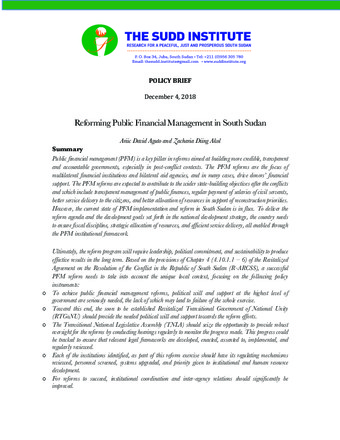Reforming Public Financial Management in South Sudan
Publication Summary
Public financial management (PFM) is a key pillar in reforms aimed at building more credible, transparent and accountable governments, especially in post-conflict contexts. The PFM reforms are the focus of multilateral financial institutions and bilateral aid agencies, and in many cases, drive donors’ financial support. The PFM reforms are expected to contribute to the wider state-building objectives after the conflicts and which include transparent management of public finances, regular payment of salaries of civil servants, better service delivery to the citizens, and better allocation of resources in support of reconstruction priorities. However, the current state of PFM implementation and reform in South Sudan is in flux. To deliver the reform agenda and the development goals set forth in the national development strategy, the country needs to ensure fiscal discipline, strategic allocation of resources, and efficient service delivery, all enabled through the PFM institutional framework.
Ultimately, the reform program will require leadership, political commitment, and sustainability to produce effective results in the long term. Based on the provisions of Chapter 4 (4.10.1.1 – 6) of the Revitalized Agreement on the Resolution of the Conflict in the Republic of South Sudan (R-ARCSS), a successful PFM reform needs to take into account the unique local context, focusing on the following policy instruments:
- To achieve public financial management reforms, political will and support at the highest level of government are seriously needed, the lack of which may lead to failure of the whole exercise.
- Toward this end, the soon to be established Revitalized Transitional Government of National Unity (RTGoNU) should provide the needed political will and support towards the reform efforts.
- The Transitional National Legislative Assembly (TNLA) should seize the opportunity to provide robust oversight for the reforms by conducting hearings regularly to monitor the progress made. This progress could be tracked to ensure that relevant legal frameworks are developed, enacted, assented to, implemented, and regularly reviewed.
- Each of the institutions identified, as part of this reform exercise should have its regulating mechanisms reviewed, personnel screened, systems upgraded, and priority given to institutional and human resource development.
- For reforms to succeed, institutional coordination and inter-agency relations should significantly be improved.
- Finally, the PFM should be continuously tracked and evaluated using a standard M & E framework for improvements.
Ariic David Aguto Reng's Biography
Ariic David Aguto Reng holds a bachelor of Management (Financial Economics) from the University of Toronto and a Master of Arts in Economics. He has a wealth of professional experience working in the public and the private sectors. He has worked for the Canadian Revenue Agency (CRA), The Ontario Ministry of Agriculture & Rural Affairs, Directorate of Economic Innovation. More recently with Deloitte Consulting LLP, he was an Analyst for a USAID-funded project aimed at creating macroeconomic stability and promoting core economic governance within Ministry of Finance and Economic Planning (MOFEP), Bank of South Sudan (BOSS), and the Ministry of Petroleum and Mining (MPMI). He is currently the Business Manager of the Eye Radio where he is managing and implementing a USAID-funded media development grant in South Sudan. Mr. Ariic is also an Associate Lecturer at the University of Juba where he teaches Fiscal Management in the Public Sector at the School of Public Service (SPS).

